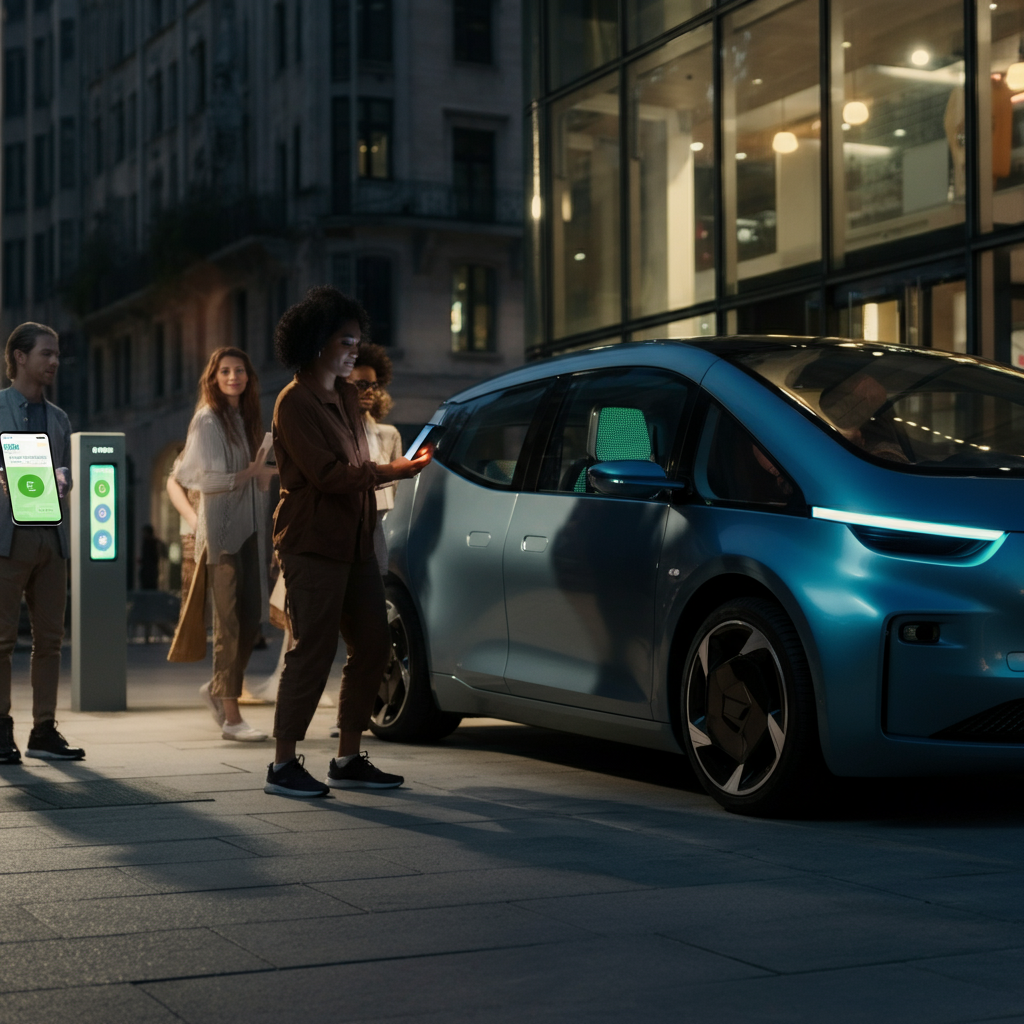Discover how scalable, AI-driven solutions are transforming vehicle access and revolutionising the customer experience in the mobility industry.
TLDR: Explore how shared mobility and the rise of car-sharing are transforming urban transportation.
- Shared mobility and car-sharing are reshaping urban transportation.
- Private car ownership is declining due to financial costs and environmental concerns.
- Different car-sharing models, like one-way and round-trip rentals, are emerging.
- These changes support sustainable urban development and reduce reliance on personal vehicles.

Read More: 5 Reasons Car Rental Customer Experience is Consistantly Bad
Shared Mobility and the Rise of Car Sharing
Private car ownership is falling out of favour in urban areas. Instead, more people are turning to shared mobility solutions like car-sharing to meet their transport needs. The appeal of flexibility, reduced costs, and environmental benefits makes shared mobility a game-changer for modern cities.
This guide dives into the factors driving this shift, highlights various car-sharing models, and forecasts how this trend will influence cities, businesses, and the transportation industry at large.
Why Shared Mobility Is on the Rise
A New Mindset Around Ownership
Car ownership was once seen as a status symbol, but younger generations now prioritise experiences, convenience, and sustainability. Millennials and Gen Z look to car-sharing and other "mobility as a service" (MaaS) solutions over outright ownership.
Financial Realities
Owning a car in urban areas is expensive. Between upfront purchases, maintenance, insurance, parking, and fuel, the costs add up quickly. Car-sharing eliminates these financial burdens by allowing users to pay only when they actually need to drive.
Environmental Responsibility
Shared mobility reduces carbon emissions, traffic congestion, and the need for large parking spaces. Cities promoting sustainable lifestyles and greener infrastructure are pushing this movement further, making car-sharing an eco-friendly alternative.
The Rise of Car-Sharing Models
Car-sharing has taken the lead in the shared mobility revolution, offering flexible, easy-to-access vehicle usage without the stress of ownership. Here are the top models gaining traction today:
- Round-Trip Car Sharing: Pick up a car, use it, and return it to the same spot. Practical for planned errands and day trips, this model is used by services like Zipcar.
- One-Way Car Sharing: Flexibly pick up at one location and drop off at another. Ideal for commutes or errands, with platforms like SHARE NOW paving the way.
- Peer-to-Peer (P2P) Car Sharing: Rent cars directly from private owners through platforms like Turo, offering budget-friendly, location-specific rental options.
Each model serves a unique purpose, ensuring there's a car-sharing solution for everyone.
Read More: The Future of Shared Mobility
The Decline of Private Car Ownership
For many urban residents, car ownership has become impractical, expensive, and unnecessary. Here's how shared mobility is filling the gaps left by traditional car ownership.
- Cost Savings: Car-sharing users pay only for the time or distance they drive, avoiding hefty expenses like maintenance and insurance.
- Flexible Lifestyles: Urban dwellers increasingly rely on public transport or cycling for daily commutes, turning to shared cars for occasional use.
- Sustainability Goals: Car-sharing helps reduce traffic, emissions, and the number of vehicles needed in urban areas.
The Environmental Benefits of Car Sharing
Switching to car-sharing can have a meaningful impact on urban sustainability.
- Reduced Carbon Footprint: Each shared car can replace up to 15 privately owned vehicles, cutting both emissions and energy use.
- Electric Vehicle Adoption: Many car-sharing fleets now include electric vehicles (EVs), further reducing environmental impact and introducing more users to clean energy.
- Optimised Urban Land Use: With fewer private cars on the road, cities can repurpose parking areas for parks, cycling lanes, and pedestrian-friendly spaces.
Challenges Facing the Car-Sharing Industry
Despite its benefits, car-sharing isn’t without hurdles.
- Regulation and Policy: Navigating complex legal requirements can slow growth and increase costs for car-sharing businesses.
- Fleet Management Costs: High usage means higher wear and tear on vehicles, requiring meticulous maintenance logistics.
- Consumer Trust: Maintaining vehicle cleanliness, availability, and seamless usability is key to building customer loyalty.
The Impact on the Automotive Industry
Car-sharing has forced the automotive industry to evolve.
- Vehicle Design Shifts: Automakers are now designing more durable, easily maintainable vehicles optimised for high-frequency usage in car-sharing fleets.
- Collaborations and Partnerships: Manufacturers like BMW and GM are partnering with shared mobility services to tap into new markets.
- Future Business Models: Subscription-based car access and shared mobility offerings are replacing traditional car sales in urban markets.
Looking to the Future
Shared mobility is set to keep growing, reshaping not only cities but the entire transport industry.
Autonomous Fleets
The introduction of autonomous vehicles into car-sharing could reduce costs, improve fleet efficiency, and enhance user convenience.
Urban Infrastructure Changes
Less demand for parking spaces opens up urban land for green areas, bike lanes, and wider streets. Smart infrastructure, like real-time vehicle tracking, will further optimise shared mobility services.
Predicted Growth
The global car-sharing market is expected to hit £13 billion by 2025, with cities like London, Singapore, and New York at the forefront of this urban transport revolution.
A New Era of Urban Mobility
Car-sharing isn’t just a trend; it’s the future of urban transportation. For city dwellers, it provides convenience, cost savings, and an eco-friendly alternative to traditional car ownership. For businesses and automakers, it represents a powerful shift in consumer behaviour that redefines success in the mobility market.
Want to learn more about how shared mobility is transforming urban transport or find opportunities in this evolving sector? Get in touch with Tomorrow’s Journey and explore the future of smart mobility.
Explore Our Latest Insights
Discover trends and innovations in the automotive sector.







